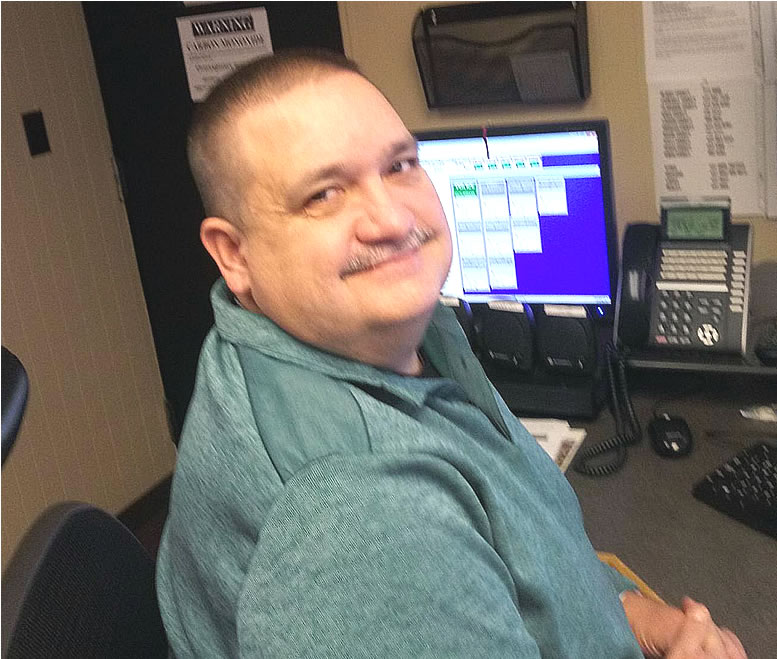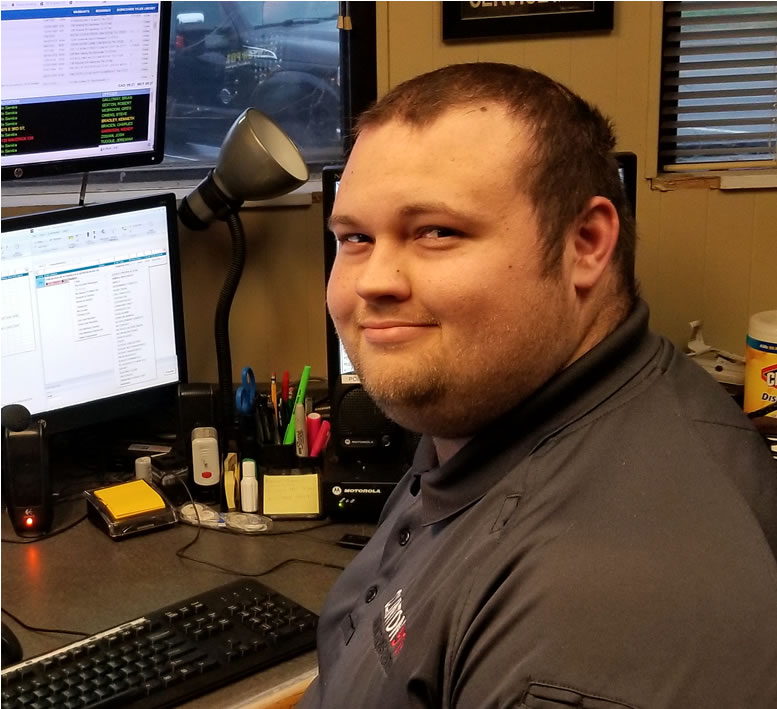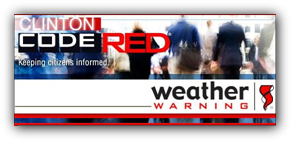TAC
E-911 Mission Statement
The City of Clinton Public Safety Communications Center strives to provide the most effective emergency and non-emergency communications possible. To attain this goal we must establish professional standards and attract, train, and retain the qualified employees nessessary to provide this service.
Department Goals

Amie Jones

David Brooks

Tyler Lindsey
Alt TAC
About 911
CodeRed Enrollment Information
The City of Clinton -
has instituted a rapid emergency notification and Weather Warning service called CodeRED®. The system distributes emergency messages and weather alaerts via telephone to targeted areas or the entire city at a rate of 1,000 calls per minute. CodeRED® employs a one-of-a-kind Internet mapping capability for geographic targeting of calls, coupled with a high speed telephone calling system capable of delivering customized pre-recorded emergency messages and severe weather alerts directly to homes and businesses, individuals and answering machines. You can register today to be added to the emergency call list.
Clinton's CodeRED system can be used in case of major fires, chemical spills, evacuations, lock downs, natural disasters, abductions, major water system problems, bomb threats and other emergencies. Calls can be geographically targeted for localized messaging. If widespread, the entire community could be called in a matter of minutes.
Residents, who live inside the Clinton City limits, are welcome and encouraged to enter their contact information for home, business and mobile phones so they may be contacted by the system in the event of an emergency. It is important for residents and businesses to register, especially if they use unlisted numbers, cell phones or VOIP. Those who do not register their address and phone number may not be notified with CodeRED in the case of an emergency.
Registration is confidential, free and easy.
Click Here to Register Your Information
Or just text ClintonTN to 99411
NEED HELP WITH CodeRED?
CALL (TOLL FREE) 866-939-091
CodeRED FAQs
CodeRED Weather Warning FAQs
Register your Information or just text ClintonTN to 99411
NEED HELP WITH CodeRED?
CALL (TOLL FREE) 866-939-0911
The History of 911
How to Call 911
Calling 911 is very stressful and it's easy to feel overwhelmed. 911 call-takers are trained to guide callers through the experience, but knowing what to expect can help make the 911 call go smoothly and get emergency help where and when it's needed.
Know the difference between calling 911 from a landline phone and calling 911 on a cell phone. If you choose to call 911, know what to expect and how to react.
Here's How:
Stay calm. It's important to take a deep breath and not get excited. Any situation that requires 911 is, by definition, an emergency. The dispatcher or call-taker knows that and will try to move things along quickly, but under control.
Know the location of the emergency and the number you are calling from. This may be asked and answered a couple of times but don't get frustrated. Even though we may be able to see your location on the computer screen -- we are still required to confirm the information. If for some reason you are disconnected, at least police and fire units will know where to go and how to call you back.
As the call progresses, you may hear clicking - do not hang up!
Wait for the call-taker to ask questions, then answer clearly and calmly. If you are in danger of assault, the dispatcher or call-taker will still need you to answer quietly, mostly "yes" and "no" questions.
Let the call-taker guide the conversation. He or she is typing the information and relaying your situation to units in the field.. and may seem to be taking forever. There's a good chance, however, that emergency services are already being sent while you are still on the line.
Follow all directions. In some cases, the call-taker will give you directions. Listen carefully, follow each step exactly, and ask for clarification if you don't understand.
Keep your eyes open. You may be asked to describe victims, suspects, vehicles, or other parts of the scene.
Do not hang up the call until directed to do so by the call-taker.
Tips:
No matter what happens - Stay Calm.
Cell phones may not tell the call-taker where you are. Try to look for street signs, business names and other landmarks.
Never program 911 into your automatic dialer (phone memory). You're not going to forget the number and accidental 911 calls are more likely with auto-dialers. If someone calls 911 and doesn't speak, emergency services must still be dispatched.
Calling on a Cell Phone
In most situations, when you call 911, emergency responders can find you - even if you don't know where you are or can't communicate. That's because calling 911 from a landline (a telephone connected to the lines on the poles) makes a computer in the dispatch center show the number and address of the phone you're using.
Cell Phones Don't Work the Same
When you make a 911 call on a cell phone, you are sending signals through the air. The tower that picks up your phone's signal may be near, but it isn't enough to tell the dispatcher where to find you.
The Federal Communications Commission has required that all wireless carriers be able to pinpoint your location for the 911 dispatchers, but the rule is coming in phases and there are plenty of exceptions.
Location, Location, Location
When you call 911 from a cell phone, there are two pieces of information the call-taker needs to know immediately:
Tell the call-taker which city you're calling from.
Tell the call-taker what type of emergency you have.
Different emergency services may use different dispatch centers. With the right information, the call-taker will transfer you to the right center.
Any Phone Will Do
Wireless carriers are required to complete 911 calls, even when the phone is not activated. Any phone that turns on and can receive a signal is capable of making a 911 call. The problem is: if the phone you're using isn't activated, there isn't a phone number assigned to it. That means if you're disconnected from the dispatch center, you must call 911 back. They will not have a way to call you.
Stay calm be clear
Professional call-takers are trained to get information from you. They will ask all the relevant questions. Listen carefully, and answer as concisely as possible. Remember, responders can only respond if they know where they're going. Make sure you get the location as detailed as possible.
The FCC says 30% of all 911 calls come from cell phones. With this simple advice, you can summon the help you need from your cell phone.
When to Call 911
Sometimes it’s necessary to call 911 to report a crime that is occurring, a potential immediate threat, the sudden severe illness or injury of yourself or someone else, or for numerous other reasons. There are also plenty of situations that may warrant a call to the police, a hospital or the fire department,.. but may not be emergencies. In other words, sometimes it isn’t necessary to call 911 because the situation you plan to report is not immediate, not immediately hazardous, or is too minor to require police, firefighter or emergency medical visiting you right away.
911 exists to deal with emergency situations. An emergency in this sense can be defined as one that poses immediate danger to yourself or other people.
Here are a couple ideas of an emergency:
Someone becomes suddenly dangerously ill.
Someone crashes a car in front of you.
You notice smoke in your home or that of a neighbor’s.
You hear gunshots.
You see or hear an incident of domestic violence
In these cases and in numerous others, calling 911 is a completely justifiable act.
There are times when you might simply want to report the results of a minor crime, have a simple question, or report the theft of a small item. In these cases, instead of calling 911 you should call the police (865-457-3112) and fire department’s (865-457-2131) regular phone number. Ask yourself whether a situation can wait for a few hours or needs to be handled right away.
The trouble with calling 911 when no emergency truly exists is that you run the risk of taking up a dispatcher's time when you don’t really need to. This could make it harder for someone with a truly emergent situation to reach 911 when needed. 911 doesn’t exist to answer simple questions, but instead exists solely to help dispatch emergency crews as needed when a crime, serious illness or immediate fire hazard exists.
Here are a few examples of when not to call 911:
You notice graffiti on your home, or in your neighborhood.
You have a question about the risks of carbon monoxide poisoning but don’t suspect it in your home.
You or a family member has a minor illness.
Your bike is missing when you come home.
Your pet is missing.
You suspect that a neighbor may be a drug dealer or is conducting ongoing illegal activity that doesn’t pose an immediate threat.
You think a neighbor’s animal may be neglected.
These types of situations should all be handled by calling during regular police or fire department hours, or by calling your physician. The goal in determining whether or not to call 911 is to decide whether your situation is truly an emergency. Different rules exist for different people.
A child who is home alone and fears a situation could be an emergency should definitely call 911. Dispatchers tend to want to get these calls even if a child’s report doesn’t really constitute an emergency. If you suspect any situation to be immediately or in the very near future dangerous, then it is important to call 911 instead of waiting.
On the other hand, when you know a situation is not immediately dangerous, and will not result in risk to anyone’s life or major property, don’t call 911. Instead wait, and talk to your local police or fire department, or your doctor or local hospital.
Any time you have doubts about waiting, 911 will of course take your call, and it’s important not to worry about inconveniencing a dispatcher. It is better to be safe than sorry when a potential hazard exists.
Worst Reasons to Call 911
911 was created as a universal American emergency number to summon police, ambulance, or fire service help. According to The National Emergency Number Association (NENA), approximately 200 million 911 calls are made in the U.S. each year.
911 is meant for emergencies. There are certainly times when you should call 911 rather than go to the doctor. It's also important to know how to be a good 911 caller.
Unfortunately, not every call to 911 is an emergency. Some callers are seeking information rather than help. Others are simply abusing the system. In fact, in every state, it's illegal to call 911 without an emergency.
Here are our picks for worst reasons to call 911.
1. Testing to See if the Phone Works
911 will always be answered, but that doesn't mean it should be called. The Clinton City E911 Communications Center is responsible for answering all wireless 911 calls that come into our center. Several 911 centers, across the nation, say that every year on Christmas morning, they receive an increase in 911 calls from cell phones given as gifts. These calls take up valuable communication lines and may block emergency calls from making it to a dispatcher.
2. Getting the Number for the Police Department
When callers need a non-emergency number for police, fire, or ambulance, they should call 411, not 911. Any time a caller feels his or her life is in danger, he or she should call 911 - otherwise, use a non-emergency number.
3. To Ask the Police-Fire-Ambulance Agency a Question
If a caller is not in need of assistance immediately, 911 is probably the wrong number to call. When calling to ask a question and not to request immediate assistance, call the department's non-emergency number.
4. Teaching Kids to Call 911
While it is exremely important to teach kids to call 911, it's a really bad idea to actually have them do it when there is no emergency. Kids learn by example. If mom and dad seem to think it's OK to call 911 just to practice, then they will, too.
5. To Get a Cat Out of a Tree
Calling for help with animals in distress is perfectly fine - just don't call 911. Only call 911 regarding animals if the animal is endangering humans. 911 is intended for human emergencies only, all calls to request assistance for animals lost or in distress should go to an agency's non-emergency number.

